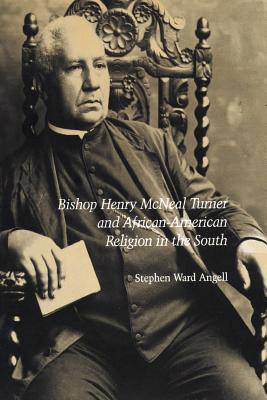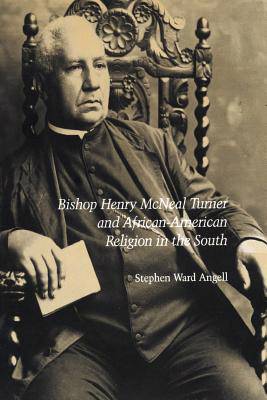
Bedankt voor het vertrouwen het afgelopen jaar! Om jou te bedanken bieden we GRATIS verzending (in België) aan op alles gedurende de hele maand januari.
- Afhalen na 1 uur in een winkel met voorraad
- In januari gratis thuislevering in België
- Ruim aanbod met 7 miljoen producten
Bedankt voor het vertrouwen het afgelopen jaar! Om jou te bedanken bieden we GRATIS verzending (in België) aan op alles gedurende de hele maand januari.
- Afhalen na 1 uur in een winkel met voorraad
- In januari gratis thuislevering in België
- Ruim aanbod met 7 miljoen producten
Zoeken
Bishop Henry McNeal Turner and African-American Religion in the South
Stephen W Angell
Paperback | Engels
€ 53,45
+ 106 punten
Omschrijving
Henry McNeal Turner was an "epoch-making man, " as his colleague Reverdy Ransom called him. A bishop in the African Methodist Episcopal Church from 1880 to 1915, Turner was also a politician and Georgia legislator during Reconstruction, U.S. Army chaplain, newspaper editor, prohibition advocate, civil rights and back-to-Africa activist, African missionary, and early proponent of black theology. This richly detailed book, the first full-length critical biography of Turner, firmly places him alongside DuBois and Washington as a preeminent visionary of the postbellum African-American experience. The strength and vitality of today's black church tradition owes much to the herculean labors of pioneers such as Turner, one of the most skillful denominational builders in American history. When emancipation created the prerequisites for a strong national religious organization, Turner, with his boldness, charisma, political wisdom, eloquence, and energy, took full advantage of the opportunity. Combining evangelicalism with forthright agitation for racial freedom, he instigated the most momentous transformation in A.M.E. Church history--the mission to the South. Stephen Angell views Turner's advocacy of ordination for women and his missionary work in Africa as a further outgrowth of the bishop's deep evangelical commitment. The book's epilogue offers the first serious analysis of Turner's theology and his replies to racist distortions of the Christian message.
Specificaties
Betrokkenen
- Auteur(s):
- Uitgeverij:
Inhoud
- Aantal bladzijden:
- 352
- Taal:
- Engels
Eigenschappen
- Productcode (EAN):
- 9781572331563
- Verschijningsdatum:
- 1/03/2002
- Uitvoering:
- Paperback
- Formaat:
- Trade paperback (VS)
- Afmetingen:
- 153 mm x 233 mm
- Gewicht:
- 530 g

Alleen bij Standaard Boekhandel
+ 106 punten op je klantenkaart van Standaard Boekhandel
Beoordelingen
We publiceren alleen reviews die voldoen aan de voorwaarden voor reviews. Bekijk onze voorwaarden voor reviews.









